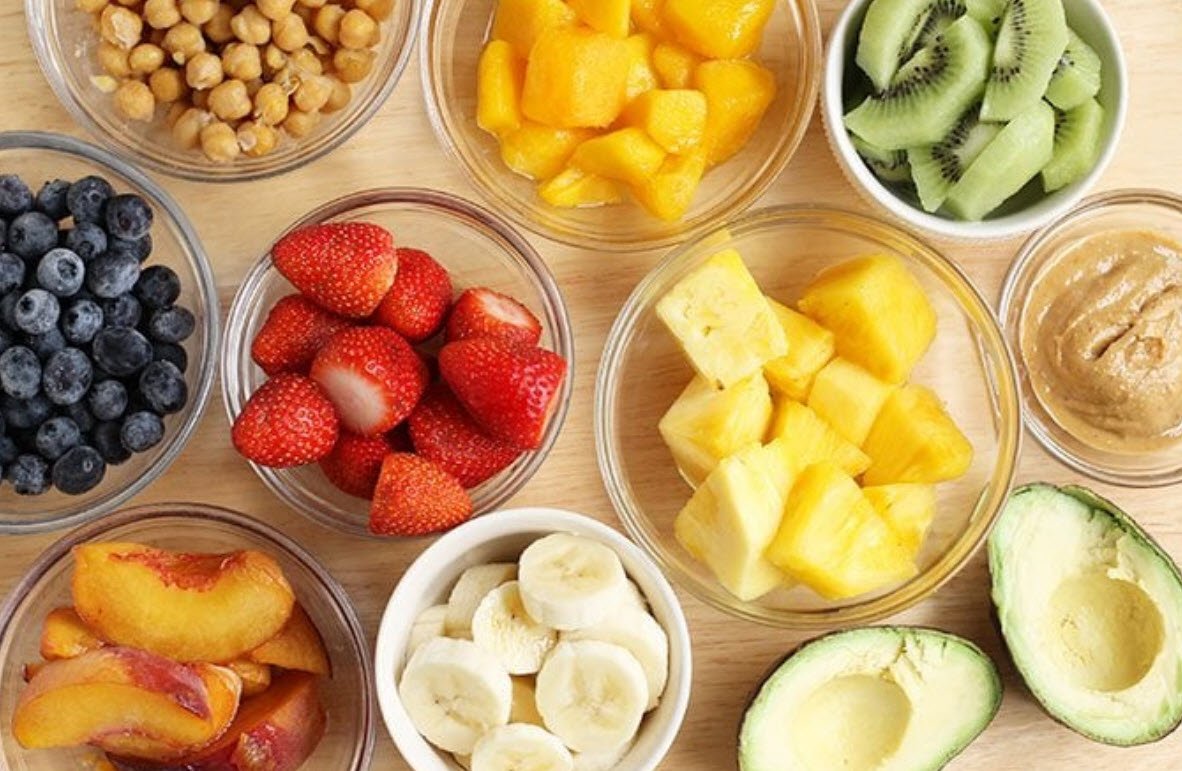
It is recommended to introduce single-grain infant cereals fortified with iron between 4-6 months of age. Then, at around 6 months, mashed or pureed vegetables and fruits can be introduced one at a time, followed by meats at around 8 months. Finger foods like soft-cooked vegetables, fruits, and pastas can be offered at around 9-12 months, and dairy products like yogurt and cheese at around 12 months.
- 4-6 Months
- Avocado
- Banana
- Peas
- Pear
- Apple
- Squash
- Sweet Potato
- Zucchini
- 7 Months
- Asparagus
- Carrot
- Green Beans
- White Potato
- Peach
- Tofu
- 8 Months
- Cantaloupe
- Watermelon
- Pineapple
- Kale
- Plum
- Cauliflower
- Broccoli
- Eggplant
- Turnip
- 9 Months
- Red Meat
- Fish
- Turkey
- Black Beans
- Kidney Beans
- Garbanzos
- Shredded Cheese
- Whole Rice
- Pasta
4-6 Months
For babies aged 4-6 months, it’s recommended to introduce single-grain cereals mixed with breast milk or formula. After a few weeks, you can add pureed vegetables such as sweet potatoes, squash, and peas, followed by fruits such as apples, bananas, and pears. It’s important to introduce one new food at a time and wait a few days before introducing another to check for any signs of allergy or intolerance.
1) Avocado: Avocado is a great food to introduce to babies around 4-6 months of age. It’s nutrient-dense and packed with healthy fats that are important for a baby’s growth and development. To introduce avocado to your baby, mash it up to a smooth consistency or serve it as a puree. Start with small amounts and gradually increase the quantity as your baby gets used to it.
2) Banana: Bananas are a great first food for babies around 4-6 months of age, as they are easy to digest, soft, and high in nutrients like potassium and fiber. You can mash or puree the banana and serve it on its own or mix it with breast milk or formula to make it smoother and more liquid.
3) Peas: Peas are a great food to introduce to babies around 4-6 months. They are packed with nutrients like Vitamin A, C, and iron. Steam or boil the peas until they are soft and then puree them until they are a smooth consistency before serving to your little one.
4) Pear: Pears are a good source of fiber, vitamins, and minerals, making them a healthy choice for babies. They can be introduced to babies as early as 4-6 months old, mashed or pureed. It’s a good idea to cook pears until they are soft and easily mashed or pureed for easier digestion.
5) Apple: Apples can be introduced to babies around 4-6 months of age, as they are a good source of fiber, vitamins, and antioxidants. They can be cooked and mashed, or steamed and cut into small pieces for babies to hold and eat. Apples can also be mixed with other fruits or vegetables to create new flavours.

6) Squash: Squash is a great food for babies between 6 to 8 months old, as it is easy to digest and rich in vitamins and minerals. You can either steam or bake it until it is soft, and then mash or puree it to a consistency suitable for your baby’s age and developmental stage.
7) Sweet Potato: Sweet potato is a nutritious vegetable that is easy to prepare for babies. It can be mashed, pureed, or cut into small pieces for them to pick up. Sweet potato is high in fiber, vitamin A, and potassium, making it a great choice for babies aged 4-6 months and up.
8) Zucchini: Zucchini is a great first food for babies as it is easy to digest and contains essential nutrients such as vitamin C, fiber, and potassium. It can be steamed, baked, or boiled and then mashed or pureed to a smooth consistency for the baby to eat.
7 Months
At around 7 months, babies are generally ready to try a wider range of foods and textures. Cooked and pureed vegetables: carrots, sweet potatoes, peas, squash, green beans, etc. Soft, ripe fruits: bananas, avocados, peaches, pears, plums, etc. Soft, cooked meats: chicken, turkey, beef, pork, etc. Cooked and mashed beans: lentils, chickpeas, black beans, et
1) Asparagus: Asparagus is a perennial vegetable that typically takes about 2 to 3 years to mature before it can be harvested. During the first year of growth, asparagus plants are typically allowed to grow without being harvested in order to allow the plant to establish its root system and build up its energy reserves.
2) Carrot: Carrots typically take 2-4 months to mature, depending on the variety and growing conditions. If planted 7 months ago, the carrots should be fully mature and ready for harvesting.
3) Green Beans: Depending on the variety and growing circumstances, green beans typically require 50 to 60 days to reach maturity. The green beans ought to be mature and ready for numerous harvests if they were planted seven months ago.
4) White Potato: White potatoes typically take about 90-120 days to mature, depending on the variety and growing conditions. If planted 7 months ago, the potatoes should have matured and been ready for harvest.
5) Peach: Peach trees typically take 2-4 years to mature and produce fruit, depending on the variety and growing conditions. If the tree was planted 7 months ago, it is unlikely to have produced fruit yet.
6) Tofu: Tofu is a soy-based product that is made by coagulating soy milk and pressing the resulting curds into blocks. It does not involve growing or planting, but rather a manufacturing process.
8 Months
At 8 months, babies can try mashed or finely chopped soft cooked vegetables and fruits such as potatoes, squash, apples, pears, and bananas. They can also have soft foods like cheese and well-cooked pasta. Finger foods like small pieces of toast, crackers, and soft-cooked vegetables are good options to encourage self-feeding.
1) Cantaloupe: If you are asking about feeding a baby cantaloupe at 8 months of age, it is generally safe to introduce cantaloupe to a baby’s diet around 6-8 months of age, once they have started eating solid foods and have shown readiness for more variety in their diet.
2) Watermelon: If you are asking about feeding a baby watermelon at 8 months of age, it is generally safe to introduce watermelon to a baby’s diet around 6-8 months of age, once they have started eating solid foods and have shown readiness for more variety in their diet.
3) Pineapple: Pineapple is a tropical fruit that is a good source of vitamin C, manganese, and bromelain. It has a sweet and tangy flavor and can be enjoyed fresh, canned, or cooked in a variety of dishes.

4) Kale: If you are asking about feeding a baby kale at 8 months of age, it is generally safe to introduce kale to a baby’s diet around 6-8 months of age, once they have started eating solid foods and have shown readiness for more variety in their diet.
5) Plum: When it comes to feeding an infant plum at the age of eight months, it is usually safe to do so because the fruit is a good source of fibre and vitamins A and C.
6) Cauliflower: If you are asking about feeding a baby cauliflower at 8 months of age, it is generally safe to introduce cauliflower to a baby’s diet as it is a good source of vitamins C and K, and fiber.
7) Broccoli: Broccoli is a nutrient-dense vegetable that is a good source of vitamins A, C, and K, as well as fiber and folate. It can be steamed, roasted, or pureed for babies.
8) Eggplant: Eggplant is a low-calorie vegetable that is rich in fiber, vitamins, and minerals. It can be grilled, baked, or roasted to enhance its flavor and texture. It is a good source of antioxidants and may have benefits for heart health, digestion, and brain function. However, it may cause allergic reactions in some individuals.
9) Turnip: Turnip is a root vegetable that is rich in vitamins and minerals, including vitamins C and K, folate, and calcium. It can be roasted, mashed, or pureed for babies. Turnips may have potential health benefits, including improved digestion, lower inflammation, and better bone health.
9 Months
At 9 months, babies can start exploring new flavors and textures. You can offer soft cooked vegetables like carrots, broccoli, and cauliflower. You can also introduce small pieces of soft fruits like bananas and avocados. Yogurt and cheese are great options for dairy. Protein can come from mashed beans, cooked lentils, or scrambled eggs. Always introduce one food at a time to watch for any allergic reactions.
1) Red Meat: It is generally recommended to wait until 12 months to introduce red meat to a baby’s diet. When introducing it, choose lean cuts and prepare it in a healthy way, such as grilling or baking.
2) Fish: Fish can be introduced to a baby’s diet at 6-9 months of age, but it is important to choose low-mercury options and avoid shellfish and large fish. Cooked, flaked fish can be added to purees or served as finger foods.
3) Turkey: Turkey is a lean meat that is a good source of protein, iron, and zinc. It can be introduced to a baby’s diet around 7-9 months of age, once they have started eating solid foods. Choose lean cuts of turkey and cook it thoroughly, avoiding added salt or seasonings. Turkey can be pureed or minced for younger babies, or served as small pieces for finger foods. It is important to monitor for any signs of allergic reactions when introducing new foods.
4) Black Beans: Black beans are a nutritious food that is high in protein, fiber, and various vitamins and minerals. They can be introduced to a baby’s diet around 8-10 months of age, and can be mashed, pureed or cooked and served as finger foods. Black beans are a great plant-based source of protein and can be beneficial for digestive health.
5) Kidney Beans: Kidney beans can be a nutritious food for babies, but they should be introduced in small amounts and cooked thoroughly to make them easier to digest. It’s important to consult with a pediatrician before introducing any new food to a baby’s diet. Kidney beans are a good source of protein, fiber, iron, and other important nutrients.
6) Garbanzos: Garbanzos, also known as chickpeas, are a versatile legume that are rich in protein, fiber, and other important nutrients. They can be used in a variety of dishes, including salads, soups, stews, and hummus. Soaking and cooking garbanzos properly can help improve their digestibility.
7) Shredded Cheese: Shredded cheese is a convenient and versatile ingredient that can be used in a variety of dishes, including pizza, tacos, salads, and sandwiches. It’s important to choose a high-quality cheese and store it properly to maintain freshness.
8) Whole Rice: Whole rice, also known as brown rice, is a nutritious grain that is rich in fiber, vitamins, and minerals. It has a nutty flavor and can be used in a variety of dishes, including stir-fries, salads, and pilafs.
9) Pasta: Pasta can be a nutritious and convenient food option for babies when introduced properly. It’s important to choose a high-quality pasta made from whole grains and to cook it until it’s soft and easy to chew. Small shapes like elbow macaroni or small shells are easier for babies to handle. Avoid adding salt, sugar, or high-fat sauces and consider adding vegetables or a small amount of olive oil for added nutrition.
You may also read:
- Nourishing Passion – Specific Foods to Promote Sexual Health
- The Power of Compound Exercises – 5 Essential Moves for Full-Body Strength
- Alteryx Text Mining
- Exploring the Delightful World of Cold Sauces – From Aioli to Tapenade
- 11 Powerful Poses to Help You Shed Pounds
- How To Prepare Keto Vanilla Cake
- 15 Different Types of Citrus Fruits You Need To Know
- A Guide to the Diverse World of Peppers
- Exploring the World of White Teas – A Delicate Symphony of Flavors
- Crafting a Vienna Vanilla Coffee Latte
- 4 Easy Steps to Prepare the Perfect Macchiato
- Cold Water vs. Hot Water – A Comparison of Health Benefits
- Exploring the 12 Universal Laws – A Guide to Understanding Life and Reality
- 20 Snacks Under 100 Calories – All You Need To Know
- Sunset Smoothie For Weight Loss – Preparation and Benefits








